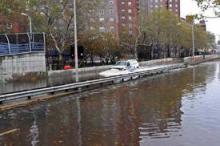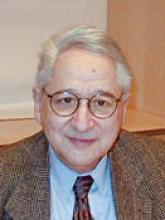As Hurricane Sandy was predicted to hit the New York/New Jersey area, I was able to make what I believed were more than adequate preparations. I needed to stock up on food, especially the nonperishable foods and water; make sure that I had flashlights and enough batteries; keep a battery radio around; and have a bag of essentials packed – in addition to a place to retreat to if my safety was at stake.
Indeed, I prepared. This was not going to be a hurricane Andrew or Katrina for me. I would weather it with ease as I’ve done in the past. Secure in my New York City apartment, opposite the NYU Langone Medical Center, where I trained and remain on the faculty, I was secure and offered comfort to many of my neighbors as their worries increased with the impending storm.
I watched and listened to New York City’s mayor, and the New York and New Jersey governors with their warnings and advice on storm preparations and realized I was in good shape. At around 8:30 Monday evening, the night the storm hit, my apartment lights dimmed for a brief moment. Soon after, I noticed a medical center housing complex nearby go dark. Following that, momentarily, the lights dimmed on the NYU Langone Medical and subsequently went out. I waited for the medical center’s generators to kick in as I watched from my window. It never happened.
At 8:50 p.m., my electricity went out. "Worry not," I said to myself. This is New York City, and all the power lines are underground, and there’s a deli or bodega on every corner.
I was comfortable in my darkened apartment when a friend and neighbor explained that when the lights went out, the water stopped – as the basement pumps could not work without electricity. This bothered me a bit, but I realized the power would be on soon. This was New York City.
As the hours passed, I checked the food and water, which remained cold in my refrigerator. I tuned onto an all-talk news station on my battery-operated radio, even though finding the station with one hand and the other hand holding a flashlight proved frustrating. Little did I know how my frustration would grow.
As the evening moved into night, it was reported on the news that the power from ConEdison electric station at the 14th Street was flooded, had an explosion, and that all power was out across Manhattan from 39th Street to the bottom of our crowded island. This affected a large residential and commercial part of the city.
There were no traffic lights; no food stores were open; gasoline stations were not able to pump and, in the building where I live, total darkness surrounded us, as hall and stair well emergency lighting is good for only 2 hours. Adding to this, sirens began to sound around the streets below, and ambulances were lining up in front of the NYU Langone Medical Center. As I watched, my heart sank. The hospital was being evacuated by hospital staff and EMS workers with the help of fire fighters and police officers. At the height of the storm, with the elevators not running, hundreds of patients were being carried down stairways, placed in ambulances, and sent to other hospitals.
This was the legendary NYU Medical Center where I had trained, treated patients, and supervised residents. It is where my sons were born. My father, an eye surgeon died there and recently, my four grandchildren were born there. In addition, this is an institution at which I have lifelong friendships and professional relationships. As I witnessed this evacuation, I began to feel a great loss. During that night, I slept very little and found myself watching from my window as the evacuation continued well into the next day.
On that next day, a sense of frustration and some despair began with electricity still off, no computer, the food in the refrigerator warming, the cell phone and iPad discharged, and the bathroom facilities not working because of a lack of water. This was starting to affect my emotions.
I still had a landline, and both my sons – one of whom had full power – had opened up their homes to me. But I just knew that things would get back to normal soon. This was New York City.
By Wednesday, the best information was it would be days before power would be back on. With no cell phone, computer, iPad, water, food, or electricity, I gave up and asked one of my sons to pick me up and take me to his home. During my multiple story descent in the dark, with a flashlight and a suitcase, I nearly fell – and luckily avoided a major injury.



